#more crafts
Text

:D
He's a little wonky but that's ok, I'm gonna make like a million of them btw
#genshin impact#genshin venti#hey look i'm talking#more crafts#clay this time#he's about the size of a quarter#and I'd die for him#wisp venti#a continuation of the I'm gonna make one in every way i can series
105 notes
·
View notes
Text
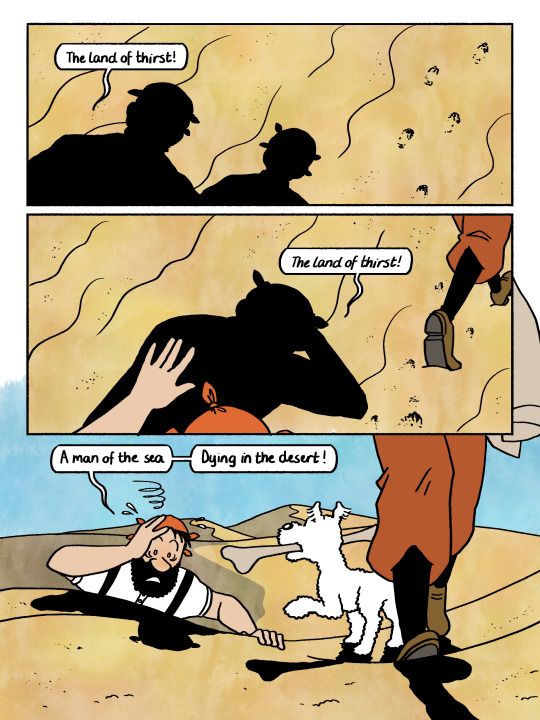
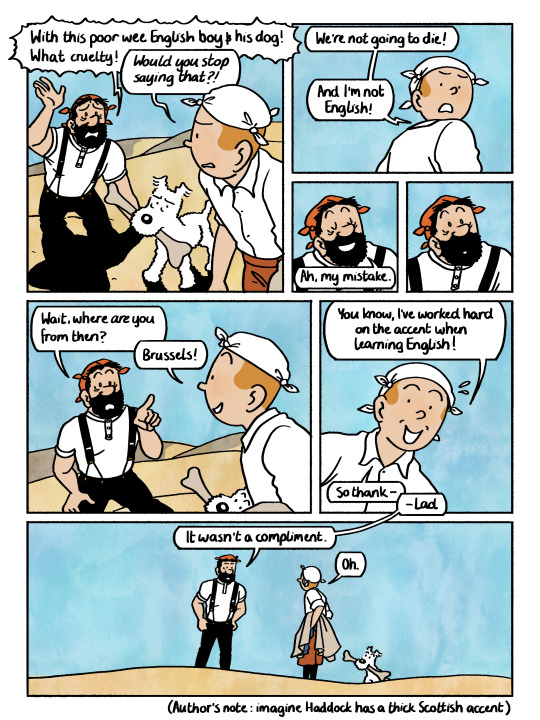
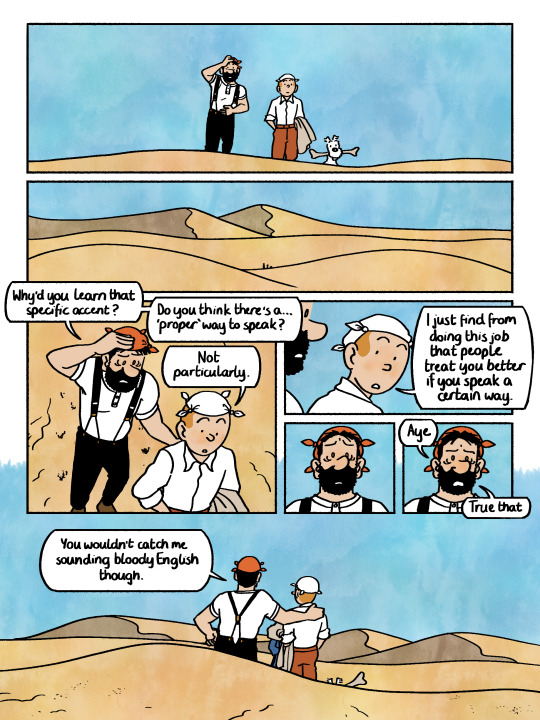
I remember discussing Tintin casting choices with a friend from Germany and remarked how it was odd he often has an English accent in adaptations rather than a Belgian one, and my friend just replied "that's because Tintin gives incredibly strong English boy energy (derogatory)"
Here in the UK there's a lot of weird classism tied into accents. Today accent diversity and representation in broadcasting is actively pursued but in Tintin's time there certainly was a preferred accent to have.
imagine this exchange happens between pages 28-29 in The Crab with the Golden Claws
#tintin#adventures of tintin#comic#captain haddock#archibald haddock#snowy#milou#fanart#the crab with the golden claws#i remember tintin crafting a trumpet to communicate with an elephant#and he remarks he must get the accent correct#very odd scenario but it shows he would be a stickler for that sort of thing#i also have to say accents do not indicate how smart someone is#a lot of pundits use an english accent to sound more credible#but i have to say there are a lot of fucking idiots here#me included#thank you 2011 film for validating my scottish haddock headcanon#any french speakers who have read to this point i wonder what your hcs are for his french speaking accent
11K notes
·
View notes
Text

Yarrow and Feverfew
Art trade with the incredible @liscepu, I'm so grateful for the chance! Thank you for fueling my love for the game again <3
#arthur morgan#red dead redemption#rdr2#rdr fanart#flowers#portrait#illustration#Also#since gathering and crafting from plants is one of my fav things in open world games I've been really enjoying drawing game characters with#like I've done with Geralt or Pathologic before - I will be definitely doing that more in the future! <3#This also reminded me I still need to return to platinum-ing RDR2...#...These damn 70 golden medals tho#I have no idea how I'll do it 💀
7K notes
·
View notes
Text




On a splendid walk!
I finished making this guy, v inspired by @slocotion, old clown dolls, and Vanessa Stockard. I'm not sure what to call him, Timothy, maybe!
#just for me not for sale#I am not allowed to monetize other hobbies lol#see my next post for more abt making him#oofa doofa#ooak#ooak doll#mal crafts
17K notes
·
View notes
Text
WAAAAAUAGRGGG!!
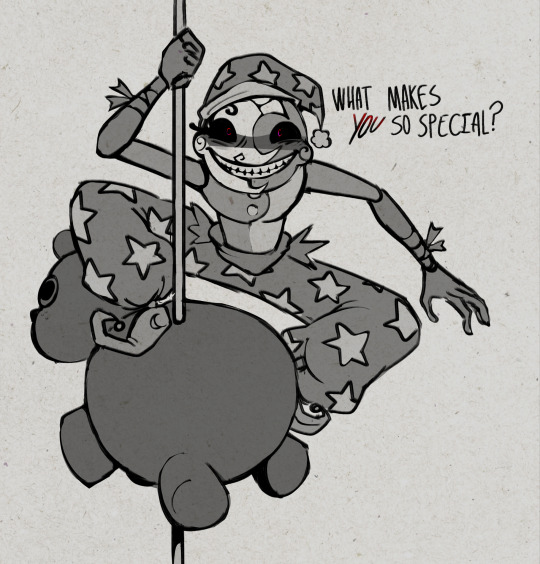
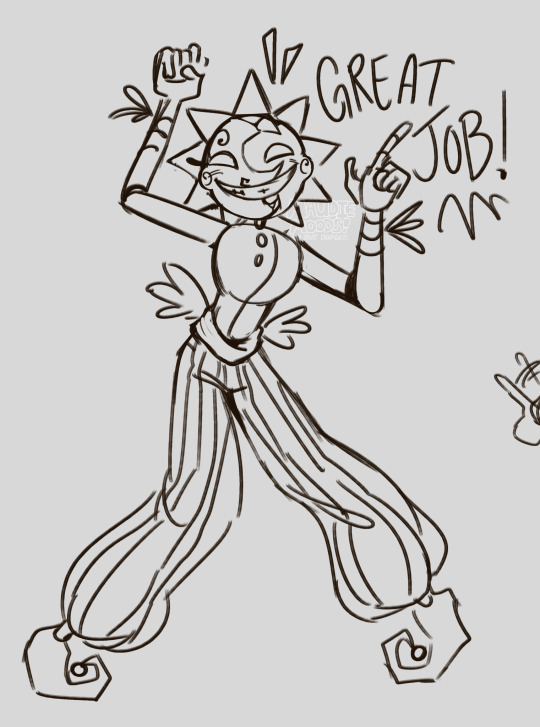
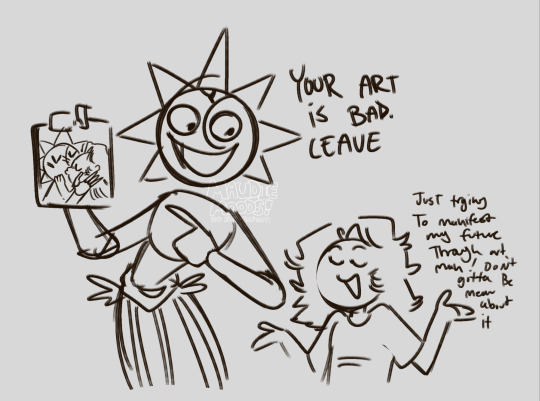





I love them so so so much!! AURGG!!
#AUGRGRGRG!!#I LOVE THEM!! the ruined version of them makes my heart ache#i need to care for them and kiss them#i need to do arts and crafts with sun (he will kick me in yhe face)#moondrop#maudiemoods art tag#security breach moondrop#fnaf security breach#sundrop#security breach sundrop#help wanted 2#help wanted spoilers#help wanted 2 spoilers#i tagged it! so don't come at me bc i didn't put all this under a read more pleeeasse <3
4K notes
·
View notes
Text
I want it back = I drag its dead weight forward
#artists on tumblr#animation#in stars and time#isat#illustration#in stars and time spoilers#isat spoilers#like for real#anyway I'm still thinking about Siffrin Instarsandtime#shoutout to tumblr user jb-blunk for the words from the caption which inspired this whole deal#literally finished the game and had those words looping (haHA) in my head like 'how do I use this what can I do to match this feeling' LMAO#if you haven't played ISAT well. first of all stop looking don't glean anything from this shhhh- but also GO PLAY IT IT'S EXCELLENT#heavily based off the astronomical clock in Prague! I love that thing so it was really fun to try and make it more ISAT-like#bc the themes are already there yanno!! Stars n' whatnot! And then of course the craft types instead of the astrological signs!#Loop and the King for the sun and the moon!!#can you tell I thought about and planned this one for like. A while. Longer than I usually spend LMAO#so yeah go play it immediately come be absolutely ILL and SICK and PLAGUED about the secret boss with me#fanart#pic
3K notes
·
View notes
Text
i am thinking how much poorer, how much less colorful the world would be if art was only made by "professionals." if all the music, all the stories, all the sketches & paintings & craftwork of the world was created only by the small category of people able to make a decent living from their art. imagine if the only people allowed to create were the experts & the renowned & those aspiring to the top. what a grey world that would be. how much joy would be bleached away! i love you people who create for the sake of creating, i love you artists who do art for tiny audiences, i love you people who make things even just for one person, even just for themselves, even if no one's watching, thank you thank you thank you for decorating the world in which we all exist
#not a shitpost#related: the most powerful crafters alive are crocheters who spend 7+ years making an intricate table cloth no one is allowed to eat on#all that arcane magic into making a display object primarily for their own enjoyment#and that of the blessed few lucky enough to be invited into their home to behold what is by rights a sacred object#if you spend a certain number of hours crafting something u have the right to have it put in a shrine or museum of your choosing i think#you have imbued it with your Life Essence by sheer force of concentration and obsession it is Holy now#anyways. old ladies who knit/crochet/embroider etc are a thousands times more powerful and intimidating#than old white dudes who are obsessed with war memorabilia or whatever#i have nothing but respect awe and appropriate amounts of fear towards crafters. my liege
11K notes
·
View notes
Text
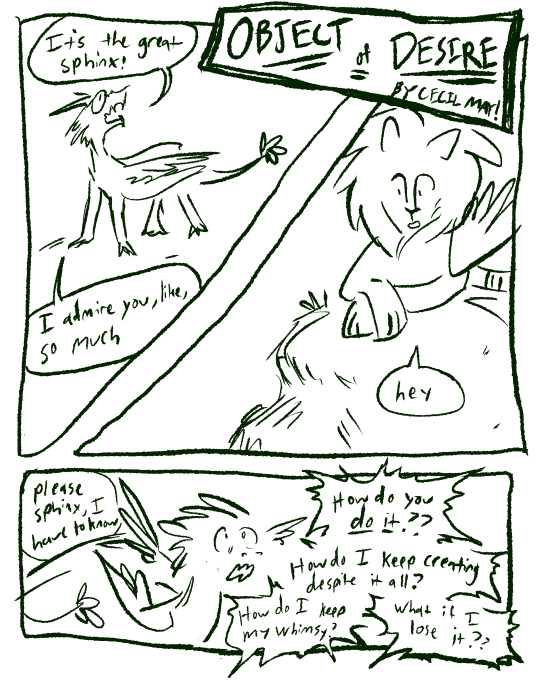
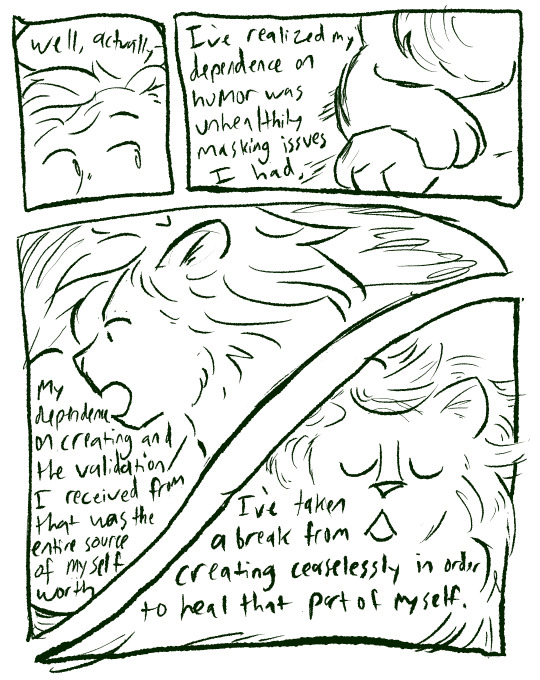
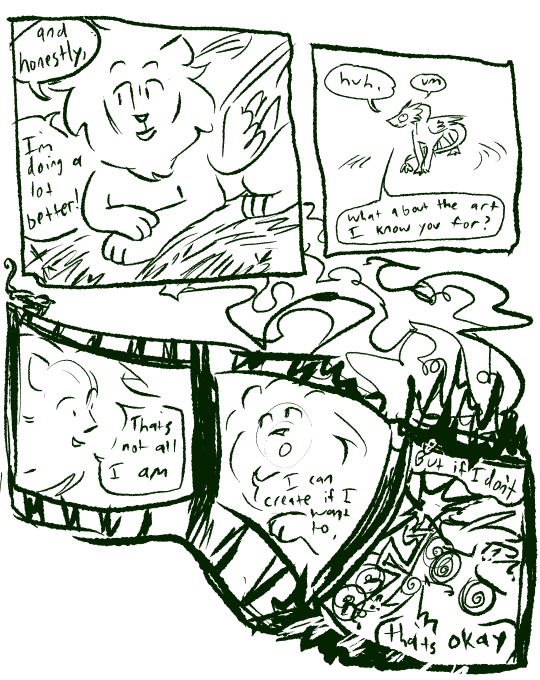
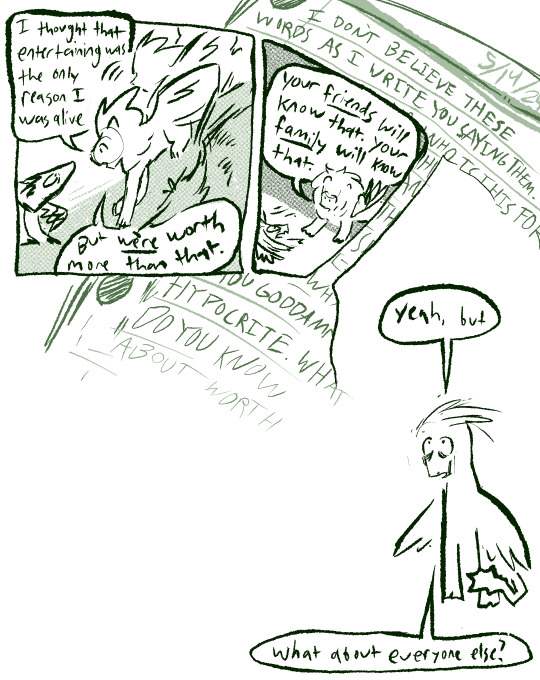
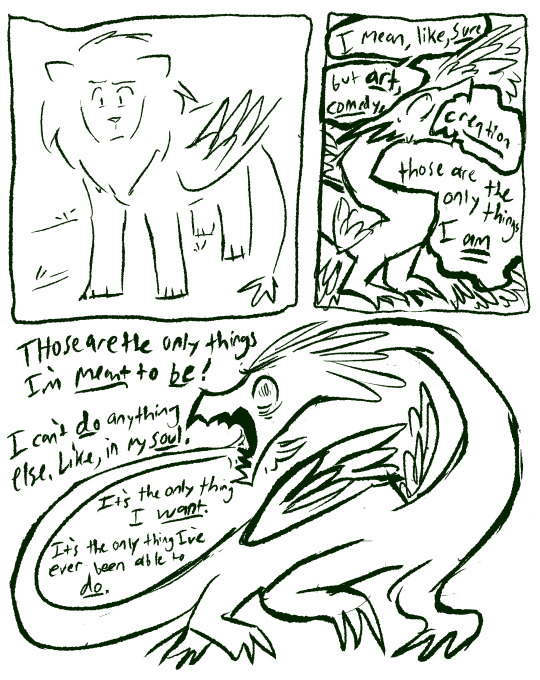
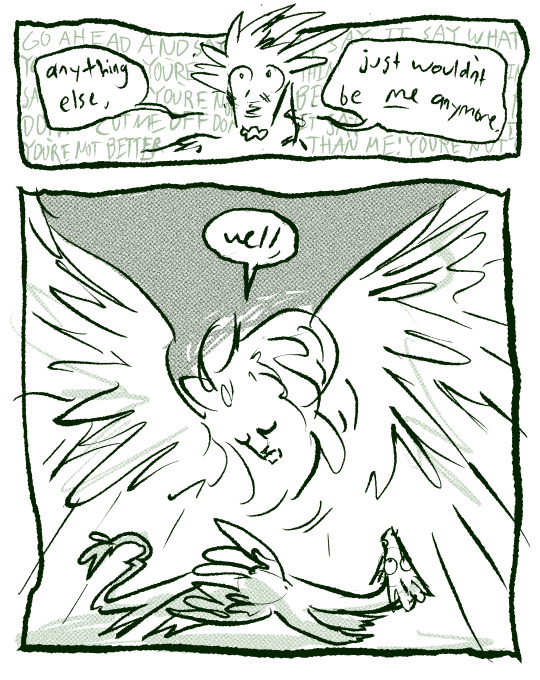
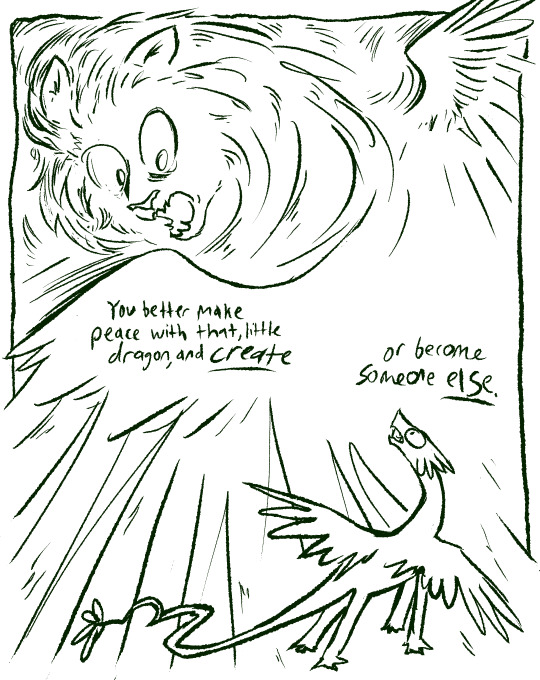
Legend tells of the carp that leapt over the Dragon Gate at the crest of a river and became a stand up comedian.
#also toyed with calling this comic riddle of the sphinx#but that had a little too much reference already associated with it#comic#comics#sphinx#dragon#ive been thinking so much about humor as related to the tortured artist and comedians and poets as sad artists etc etc#and how often that can be true but how this predominant cultural vision pigeonholes comedy as a low art or even just one you have to just#'be talented' at intrinsically. or even 'be sad enough' to be good at#instead of a craft you hone and an artform itself#this comic isnt exactly about that.#but it's related#it's more about... two very different kinds of people. but who are the same kind of artist#if that makes sense#and literally being scared of what you want#art tag#sequential art#personal comic#quite happy with how this one turned out. im excited to have made it i feel like its really different than my usual comics
2K notes
·
View notes
Text
just endlessly thinking about blue eye samurai.
thinking about how akemi, taigen, and mizu are if a coin had three sides or maybe just the two and mizu is the bridge of metal between them.
akemi being the ideal image for women, for the life they endure. she was simultaneously a princess, a prostitute, and a prisoner. her entire life was men making decisions for her, even the ones that had good intentions, and she believed her deepest desire was freedom. it still is, but she has been revealed to this heinous predicament of her gender, and she’s realized that to reach true freedom as a woman is to be the bird in the cage, to play nice and to earn the love of a man until he buys her a bigger cage and a bigger cage until he trusts her not to fly away. and it'll never be true freedom, but it will come with power. it'll come with the freedom of only one master rather than many.
taigen being the ideal image of a man. not all powerful, but not weak. he had a taste of what it'd be to succeed, and when it was taken from him, that easy success, he mistook it for his honor. he hunted mizu down to kill him, and instead he saved him. he saved him and saved him and he came closer to killing mizu when they were on the cliff's edge, and just when he gets to the point where he may actually fight mizu, he's tortured for information on him. he is tortured. Literally tortured within an inch of his life, enduring such a heinous violence, and he refuses to break. this man was a fight, was the torturer, and the victim of his torturing could've been his salvation from pain but he refused. mizu gave back taigen's honor but not by fighting him.
akemi wanted freedom and learned she would need power to have it.
taigen wanted power and learned that the violence that came with it was infinite and dishonorable.
and then there's mizu. mizu who wants revenge, wants acceptance. arguably the same things as them both. mizu wants acceptance, the freedom of living and the freedom to love and be loved. mizu wants revenge, which follows after violence and power, to get said acceptance. she thinks she must do both, have both, to live peacefully, and she's blatant about how she will not live without either.
she's given acceptance with the blacksmith, her "mother," her husband, but she sees the flecks of avoidance in it.
the blacksmith will not hear of her true gender. her "mother" will not acknowledge the crime of her birth. her husband can't find tolerance for the violence within her, the man of her.
and so she has to balance the woman and man of her, the ronin and the bride. taigen and akemi. and it's meeting mizu that they start to unravel their own identities.
mizu, who is both, and akemi and taigen who thought themselves one but turned out to be neither.
god.
#complexities#and comparisons#i think they are so much more than what i’ve said but just#the cinematography#and the metaphors#the underlying theme of birds#blue eye samurai#the poetry that you are#it feels like every scene was specifically crafted#like they did not make one undeliberate mark#like it all has meaning#i’m insane#mizu#taigen#akemi#mizu x akemi x taigen#the ronin and the bride
3K notes
·
View notes
Text
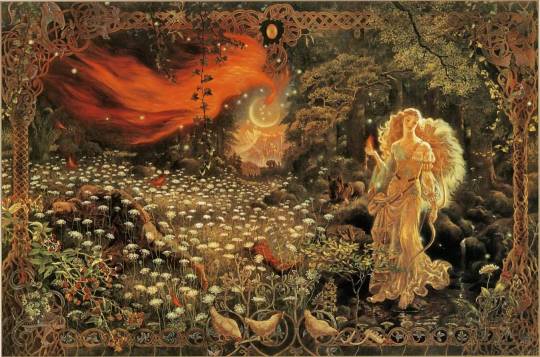
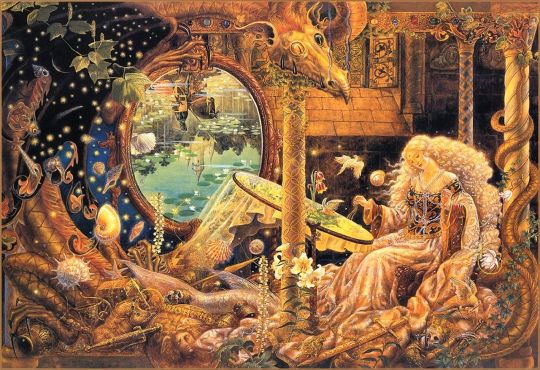
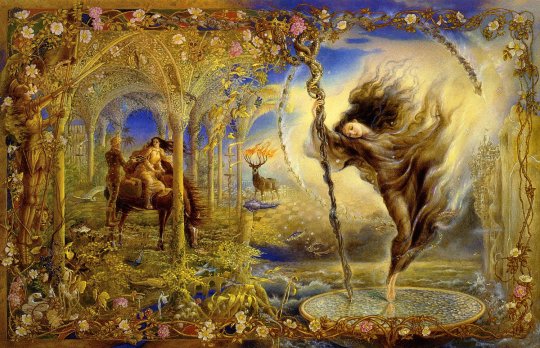
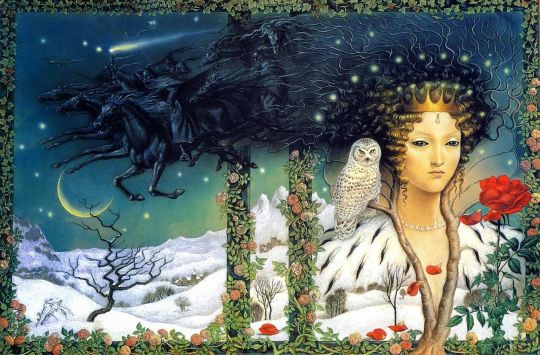
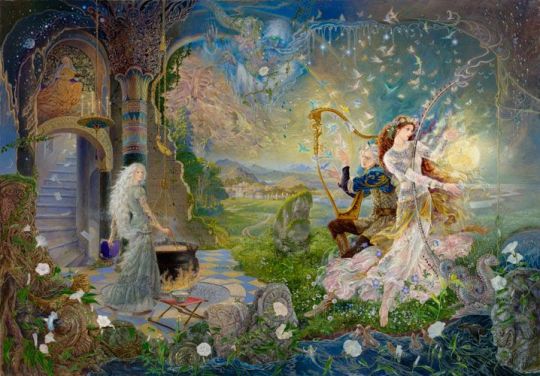
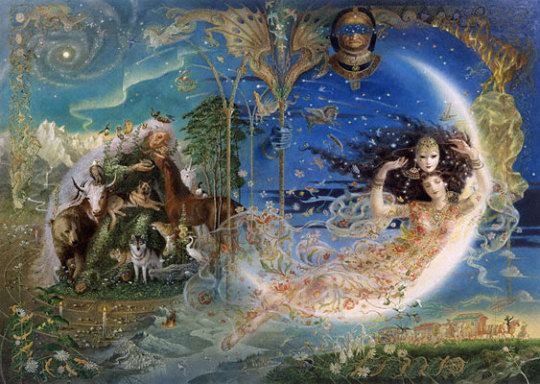
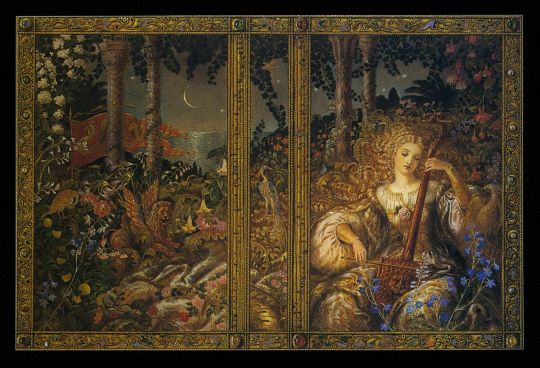

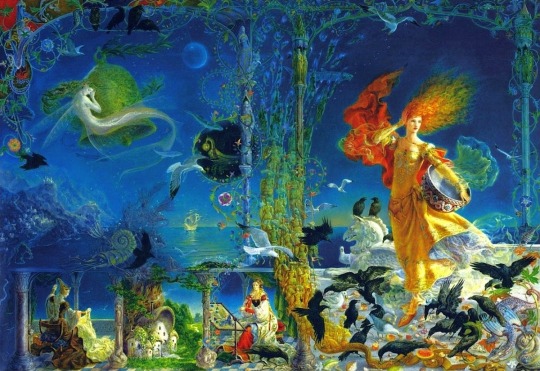
I don’t think there is any art in the world quite as astonishing as Kinuko Craft’s illustrations for Patricia McKillip’s novels
#look at the DETAIL#look at how she SPINS MAGIC WITH HER PEN#kinuko craft does for art what patricia mckillip did with words#i am literally astonished#kinuko craft has also done hundreds of other gorgeous artworks of you’re interested in more!!!#kinuko craft#kinuko y. craft#patricia mckillip#fantasy#fantasy art#art#artists#artists on tumblr
1K notes
·
View notes
Text
WENT INTO A STARDEW FUGUE STATE LADS ITS FOUR THIRTY AM MY SLEEP SCHEDULE IS FUCKED GOOD NIGHT
#BIG OOPS#BUT I F I N A L L Y GOT THAT STUPID SECOND SNAKE VERTEBRAE I NEEDED#IN ORDER TO FINISH THE ARCHEOLOGICAL TENT MISSION#IN ORDER TO GET THE OSTRICH INCUBATOR#IN ORDER TO GET MORE OSTRICH EGGS#IN ORDER TO FINALLY FUCKING SHIP EVERY ITEM IN THE GAME FOR THAT ACHIEVEMENT#AUUGHUGRUHGGHGHGH IM ON LIKE YEAR FOUR OF THE GAME OR SOME SHIT#stardew valley#okay now its time to optimize moneygain im halfway through the 10 mill achievement#plus i need the gold to pay for obelisks#after that i just need to wait til spring fest cuz i forgot to buy a spring scarecrow and then i'll be able to craft the deluxe#finish up gifts for george and then the final special order is making vodka for pam#then its JUST the gold clock
1K notes
·
View notes
Text



boo! old woman jumpscare
greyscale vers below!



#marshdoodles#isat#in stars and time#cw drinking#cw blood#<- just to be safe#people really seemed to like my odile hurt sprite redraw huh 😊😊😊😊#im so glad 😊😊😊#that redraw in particular kicked my ASS btw#ohhh my god why did i decide to change the pose. i think it turned out really good tho so w#also slipped in some personal hcs for how craft would look in color? i need to explore those ideas more#they don’t really translate too well with odile’s craft style#anyways!!! odile!!! she’s so much more fun to draw than i expected#i love drawing her hair so much… so shaped…#did have to adjust her palette a little tho (i think i only changed the book color and the gems)#overall just really happy with my design for her teehees#enjoy the old woman I Suppose
974 notes
·
View notes
Text
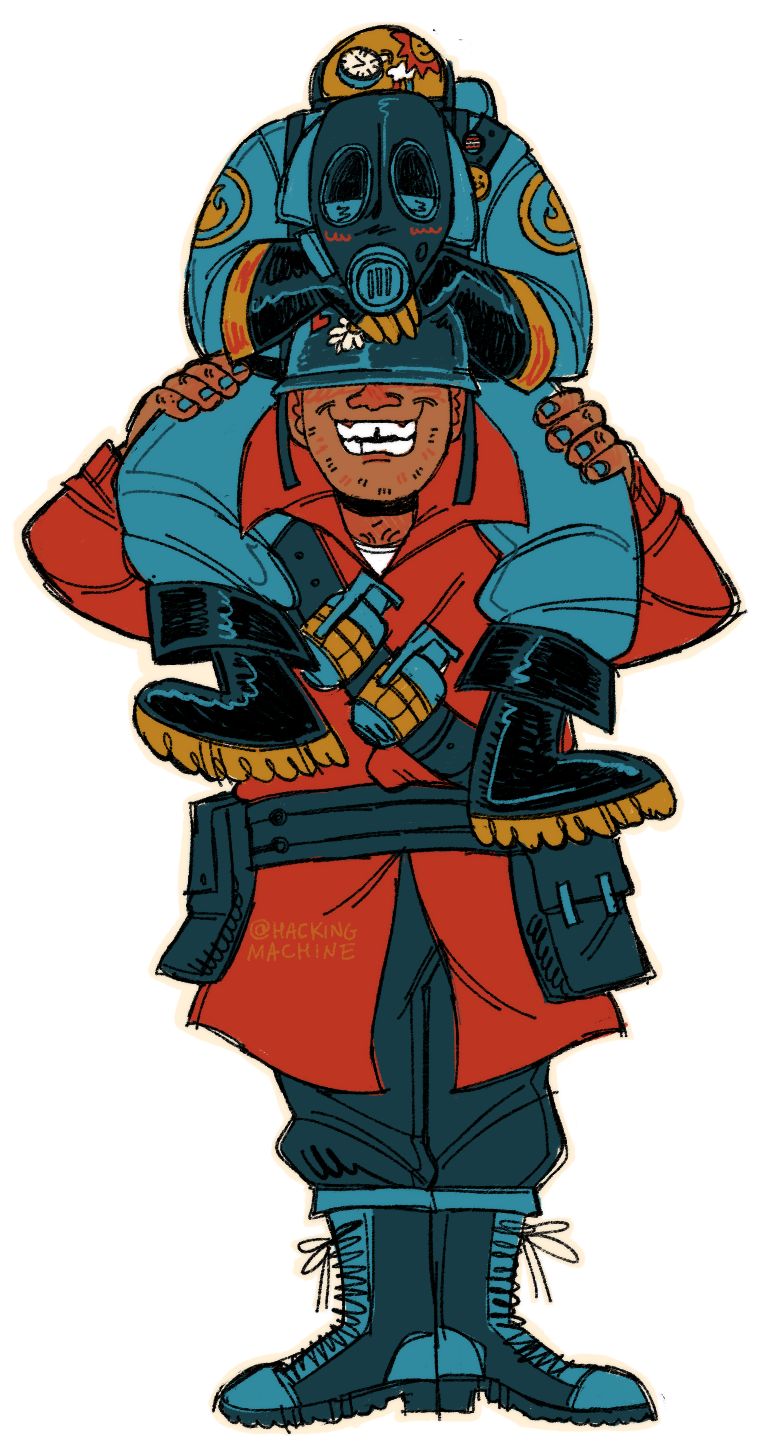
id: a digital drawing of a red soldier and a blue pyro from team fortress 2. they're both facing the viewer. pyro is sitting on soldier's shoulders, resting their hands on the top of his helmet. they look quite happy. soldier is standing upright with a grin, holding onto pyro's legs. the background is transparent except for a white outline around the characters. end id
#art#fanart#tf2#team fortress 2#soldier tf2#pyro tf2#tf2 pyro#tf2 soldier#based on. yet another 2fort experience :] i'm the soldier if you care#kind of messy because. i've been more into other crafts like sewing so. scratches my neck#<i still think this turned out super nice though. i like the vibe
4K notes
·
View notes
Text





Who wants this smelly little creature
Link to John, Javier and tutorial for the feet
#rdr2#red dead redemption two#red dead redemption 2#Arthur Morgan#papercraft#paper craft#my art#if anyone wants more just give me a request >:)#also if you make one please tag me I want to see :D
799 notes
·
View notes
Text
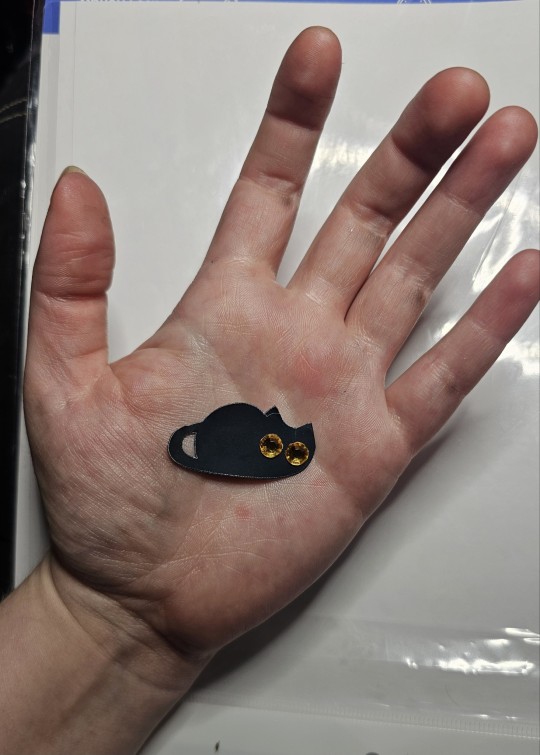

Me too
#shire craft#shire sticker#its actually a magnet!#i wont be making more tho bc the material is awful and 1/3 of my kitties lost an ear#TNR program mowing through a feral colony like 😔
524 notes
·
View notes
Text
Against Lore

For the rest of May, my bestselling solarpunk utopian novel THE LOST CAUSE (2023) is available as a $2.99, DRM-free ebook!

One of my favorite nuggets of writing advice comes from James D Macdonald. Jim, a Navy vet with an encylopedic knowledge of gun lore, explained to a group of non-gun people how to write guns without getting derided by other gun people: "just add the word 'modified.'"
As in, "Her modified AR-15 kicked against her shoulder as she squeezed the trigger, but she held it steady on the car door, watching it disintegrate in a spatter of bullet-holes."
Jim's big idea was that gun people couldn't help but chew away at the verisimilitude of your fictional guns, their brains would automatically latch onto them and try to find the errors. But the word "modified" hijacked that impulse and turned it to the writer's advantage: a gun person's imagination gnaws at that word "modified," spinning up the cleverest possible explanation for how the gun in question could behave as depicted.
In other words, the gun person's impulse to one-up the writer by demonstrating their superior knowledge becomes an impulse to impart that superior knowledge to the writer. "Modified" puts the expert and the bullshitter on the same team, and conscripts the expert into fleshing out the bullshitter's lies.
Yes, writing is lying. Storytelling is genuinely weird. A storyteller who has successfully captured the audience has done so by convincing their hindbrains to care about the tribulations of imaginary people. These are people whose suffering, by definition, do not matter. Imaginary things didn't happen, so they can't matter. The deaths of Romeo and Juliet were less tragic than the death of the yogurt you had for breakfast. That yogurt was alive and now it's dead, whereas R&J never lived, never died, and don't matter:
https://locusmag.com/2014/11/cory-doctorow-stories-are-a-fuggly-hack/
Hijacking a stranger's empathic response is intrinsically adversarial. While storytelling is a benign activity, its underlying mechanic is extremely dangerous. Getting us to care about things that don't matter is how novels and movies work, but it's also how cults and cons work.
Cult leaders and con-artists know that they're engaged in mind-to-mind combat, and they make liberal use of Jim's hack of leaving blank spots for the mark to fill in. Think of Qanon drops: the mystical nonsense was just close enough to sensical that a vulnerable audience was compelled to try and untangle them, and ended up imparting more meaning to them than the hustler who posted them ever could have dreamt up.
Same with cons – there's a great scene in the Leverage: Redemption heist show where an experienced con-artist explains to a novice that the most convincing hustle is the one where you wait for the mark to tell you what they think you're doing, then run with it (scambaiters and other skeptics will recognize this as a relative of the "cold reading," where a "psychic" uses your own confirmations to flesh out their predictions).
As Douglas Adams put it:
A towel has immense psychological value. For some reason, if a strag (strag: non-hitch hiker) discovers that a hitch hiker has his towel with him, he will automatically assume that he is also in possession of a toothbrush, face flannel, soap, tin of biscuits, flask, compass, map, ball of string, gnat spray, wet weather gear, space suit etc., etc. Furthermore, the strag will then happily lend the hitch hiker any of these or a dozen other items that the hitch hiker might accidentally have "lost". What the strag will think is that any man who can hitch the length and breadth of the galaxy, rough it, slum it, struggle against terrible odds, win through, and still knows where his towel is is clearly a man to be reckoned with.
Magicians know this one, too. The point of a sleight is to misdirect the audience's attention, and use that moment of misattention to trick them, vanishing, stashing or producing something. The mark's mind is caught in a pleasurable agony: something seemingly impossible just happened. The mind splits into two parts, one of which insists that the impossible just happened, the other insisting that the impossible can't happen.
You know you've done it right if the audience says, "Do that again!" And that's the one thing you must not do. So long as you don't repeat the trick, the audience's imagination will chew on it endlessly, coming up with incredibly clever things that you must have done (a clever conjurer will know several ways to produce the same effect and will "do it again" by reproducing the effect via different means, which exponentially increases the audience's automatic imputation of clever methods to the performer).
Not for nothing, Jim Macdonald advises his writing students to study Magic and Showmanship, a classic text for aspiring conjurers:
https://memex.craphound.com/2007/11/13/magic-and-showmanship-classic-book-about-conjuring-has-many-lessons-for-writers/
There's a version of this in comedy, too. The scholarship of humor is clear on this: comedy comes from surprise. The audience knows they're about to be surprised when the punchline lands, and their mind is furiously trying to defuse the comedian's bomb before it detonates, cycling through potential punchlines of their own. This ramps up the suspense and the tension, so when the comedian does drop the punchline, the tension is released in a whoosh of laughter.
Your mind wants the tension to be resolved ASAP, but the pleasure comes from having that desire thwarted. Comedy – like most performance – has an element of authoritarianism. You don't give the audience what it wants, you give it what it needs.
Same goes for TTRPGs: the game master's role is to deny the players the victories and treasure they want, until they can't take it anymore, and then deliver it. That's the definition of an epic game. It's one of the durable advantages of human GMs over video game back-ends: they can ramp up the epicness by "cheating" on the play, giving the players the chance to squeak out improbable victories at the last possible second:
https://wilwheaton.typepad.com/wwdnbackup/2009/03/behind-the-screen.html
This is so effective that even crude approximations of it can turn video-games into cult hits – like Left4Dead, whose "Director" back-end would notice when the players were about to get destroyed and then substantially ramped up the chances of finding an amazing weapon – the chance would still be low overall, but there would be enough moments when the player got exactly what they'd been praying for, at the last possible instant, that it would feel amazing:
https://left4dead.fandom.com/wiki/The_Director#Special_Infected
Critically, Left4Dead's Director didn't do this every time. As any showman knows, the key to a great performance is "Always leave 'em wanting more." The musician's successful finale depends on doing every encore the audience demands, except the last one, so the crowd leaves with one tantalyzing and imaginary song playing in their minds, a performance better than any the musicians themselves could have delivered. Like the gun person who comes up with a cooler mod than the writer ever could, like the magic show attendee who comes up with a more elaborate explanation for the sleight than the conjurer could ever pull off, like the comedy club attendee whose imagination anticipates a surprise that grows larger the longer the joke goes on, the successful performance is an adversarial act of cooperation where the audience willingly and unwillingly cooperates with the performer to deny them the thing that they think they need, and deliver the thing they actually need.
This is my biggest problem with the notion that someday LLMs will get good enough at storytelling to give us the tales we demand, without having to suffer through a storyteller's sadistic denial of the resolutions we crave. When I'm reading a mystery, I want to turn to the last page and find out whodunnit, but I know that doing so will ruin the story. Telling the storyteller how the story should go is like trying to tickle yourself.
Like being tickled, experiencing only fun if the tickler respects your boundaries – but, like being tickled, there's always a part where you're squirming away, but you don't want it to stop. An AI storyteller that gives you exactly what you want is like a dungeon master who declares that every sword-swing kills the monster, and every treasure chest is full of epic items and platinum pieces. Yes, that's what you want, but if you get it, what's the point?
Seen in this light, performance is a kind of sado-masochism, where the performer delights in denying something to the audience, who, in turn, delights in the denial. Don't give the audience what they want, give them what they need.
What your audience needs is their own imagination. Decades ago, I was a freelance copywriter producing sales materials for Alias/Wavefront, a then-leading CGI firm that was inventing all kinds of never-seen VFX that would blow people away. One of the engineers I worked with told me something I never forgot: "Your imagination has more polygons than anything you can create with our software." He was talking about why it was critical to have some of the action happen in the shadows.
All of this is why series tend to go downhill. The first volume in any series leaves so much to the imagination. The map of the world is barely fleshed out, the characters' biographies are full of blank spots, the mechanics of the artifacts and the politics of the land are all just detailed enough that your mind automatically ascribes a level of detail to them, without knowing what that detail is.
This is the moment at which everything seems very clever, because your mind is just churning with all the different bits of elaborate lore that will fill in those lacunae and make them all fit together.
SPOILER ALERT: I'm about to give some spoilers for Furiosa.
.
.
.
.
.
.
.
.
FURIOSA SPOILERS AHEAD!
Last night, we went to see Furiosa, the latest Mad Max movie, a prequel to 2015's Fury Road, which is one of the greatest movies ever made. Like most prequels, Furiosa functions as a lore-delivery vehicle, and as such, it's nowhere near as good as Fury Road.
Fury Road hints as so much worldbuilding. We learn about the three fortresses of the wasteland (the Citadel, the Bullet Farm, and Gastown) but we only see one (The Citadel). We learn that these three cities have a symbiotic relationship with one another, defined by a complex politics that is just barely stable. We meet Furiosa herself, and learn something of her biography – that she had been stolen from the Green Place, that she had suffered an arm amputation.
All of this is left for us to fill in, and for a decade, my hindbrain has been chewing on all of that, coming up with cool ways it could all fit together. I yearned to know the "real" explanation, but it was always unlikely that this real explanation would be as enjoyable as my own partial, ever-unfinished headcanon.
Furiosa is a great movie, but its worst parts are the canonical lore it settles. Partly, that's because some of that lore is just stupid. Why is the Bullet Farm an open-pit mine? I mean, it's visually amazing, but what does that have to do with making bullets? Sometimes, it's because the lore is banal – the solarpunk Green Place is a million times less cool than I had imagined it. Sometimes, it's because the lore is banal and stupid: the scenes where Furiosa's arm is crushed, then severed, then replaced, are both rushed and quasi-miraculous:
https://www.themarysue.com/how-does-furiosa-lose-her-arm/
But even if the lore had been good – not stupid, not banal – the best they could have hoped for was for the lore to be tidy. If it were surprising, it would seem contrived. A story whose loose ends have been tidily snipped away seems like it would be immensely satisfying, but it's not satisfying – it's just resolved. Like the band performing every encore you demand, until you no longer want to hear the band anymore – the feeling as you leave the hall isn't satisfaction, it's exhaustion.
So long as some key question remains unresolved, you're still wanting more. So long as the map has blank spots, your hindbrain will impute clever and exciting mysteries, tantalyzingly teetering on the edge of explicability, to the story.
Lore is always better as something to anticipate than it is to receive. The fans demand lore, but it should be doled out sparingly. Always leave 'em wanting more.

If you'd like an essay-formatted version of this post to read or share, here's a link to it on pluralistic.net, my surveillance-free, ad-free, tracker-free blog:
https://pluralistic.net/2024/05/27/cmon-do-it-again/#better_to_remain_silent_and_be_thought_a_fool_than_to_speak_and_remove_all_doubt
#pluralistic#writing#lore#series#science fiction#the elaborations of a bad liar#always leave em wanting more#james d mcdonald#guns#pilkunnussija#craft#Silmarillion#sf#Better to Remain Silent and Be Thought a Fool than to Speak and Remove All Doubt#magic tricks#conjuring#narrative#mad max#furiosa
1K notes
·
View notes